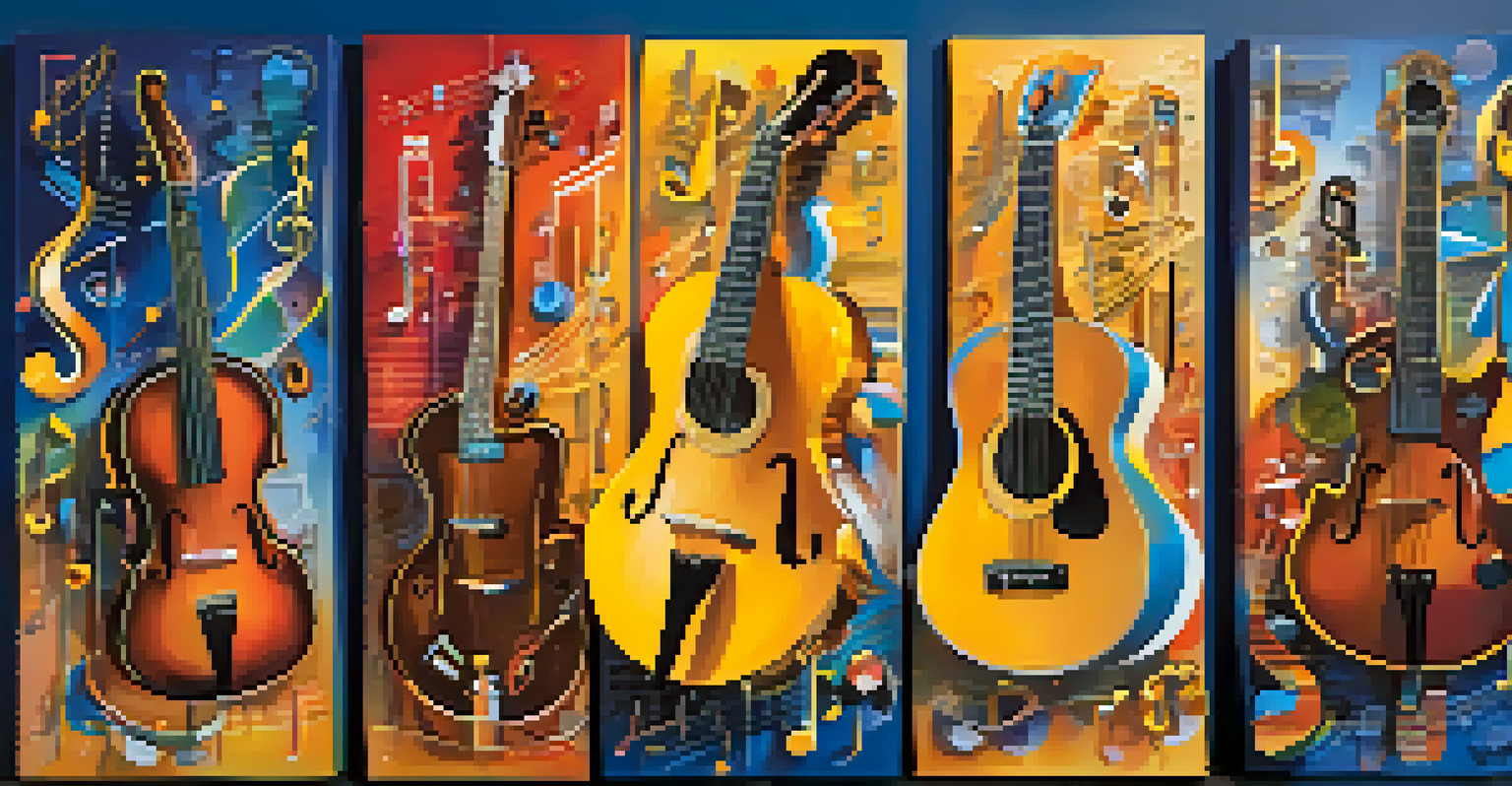The Challenge of Objectivity in Music Reviews

Understanding Objectivity in Music Reviews
Objectivity in music reviews refers to the idea of providing an unbiased evaluation of a piece of music, free from personal feelings or opinions. It’s a noble goal, but one that’s tricky to achieve. Music is inherently subjective; what resonates with one listener may not hold the same value for another. This subjectivity complicates the notion of a purely objective review.
Music is the shorthand of emotion.
For instance, think about two people listening to the same song. One might be swept away by the melody, while the other focuses on the lyrics, leading to vastly different interpretations. This divergence highlights a fundamental truth: our individual experiences shape how we perceive music. Therefore, when critics strive for objectivity, they often wrestle with their own biases.
Ultimately, the challenge lies in balancing personal insights with broader musical principles. Critics must navigate the fine line between sharing their unique perspective and providing an analysis that resonates with a wider audience. This balancing act is where the heart of music criticism truly lies.
The Role of Personal Experience in Music Reviews
Every music reviewer brings their own background, tastes, and emotions to the table. These factors can significantly influence how they interpret a song or album. For example, if a reviewer has fond memories tied to a particular genre, they may unconsciously favor music that evokes those feelings. This personal connection can color their judgment, making it hard to remain entirely objective.

Moreover, personal experiences can create a sense of authenticity in reviews. Readers often appreciate when a critic shares their own journey with a piece of music, as it adds depth and relatability. However, this authenticity can sometimes blur the lines of objectivity, leading to reviews that feel more like personal essays than critical analyses.
Balancing Objectivity and Subjectivity
Critics must navigate the challenge of providing unbiased evaluations while acknowledging their personal experiences and biases in music reviews.
Ultimately, while personal experience adds richness to music reviews, it also raises questions about the legitimacy of the critique. Can a review be truly objective if it’s heavily influenced by individual experiences? This ongoing debate underscores the complexity of music criticism.
The Influence of Genre on Objectivity
Different music genres often come with their own sets of conventions and expectations, which can complicate objectivity in reviews. For instance, a critic well-versed in classical music may approach a pop album with different criteria than a pop enthusiast would. This means that genre familiarity can shape how reviewers perceive and evaluate music.
The beauty of music is that it transcends language and culture, touching the heart of all who listen.
Consider how a jazz critic might focus on improvisation and technical skill, while a pop reviewer may prioritize catchy hooks and production quality. These varying focal points can lead to differing opinions on the same piece of music, showcasing the challenge of maintaining objectivity across genres. It’s like comparing apples to oranges, each with its own unique flavor.
Thus, genre not only influences personal taste but also sets the stage for how music is critiqued. Critics must be aware of their biases and strive to understand the context of the music they are reviewing. This awareness can help bridge the gap between subjective experience and objective evaluation.
The Impact of Cultural Context on Reviews
Cultural context plays a significant role in how music is received and reviewed. Music often reflects the values, struggles, and stories of the society from which it emerges. A reviewer’s cultural background can deeply influence their perception of a song, making it challenging to approach music from a purely objective standpoint.
For example, a song that resonates with a specific cultural experience may not have the same impact on someone outside that culture. This discrepancy can lead to misunderstandings or misinterpretations in reviews. A critic may unintentionally overlook the cultural nuances that give a song its power, resulting in a less informed evaluation.
Genre Influences Music Evaluation
Different music genres come with unique conventions that can affect how critics perceive and critique a piece of music.
Recognizing the importance of cultural context is vital for reviewers. By acknowledging their own biases and the cultural significance of the music they critique, they can cultivate a more nuanced understanding. This approach not only enriches the review but also fosters a greater appreciation for the diverse tapestry of musical expression.
Navigating the Expectations of Audiences
Music reviewers often face the challenge of meeting audience expectations while striving for objectivity. Readers come to reviews with their own preferences, hoping to find validation or insight about their favorite artists. This desire can pressure critics to align their opinions with popular sentiment, potentially compromising their objectivity.
Imagine a reviewer who loves an artist that is currently facing backlash. They may feel torn between presenting an honest critique and appeasing fans. This pressure can lead to reviews that are more about defending a position than providing a balanced analysis. It’s a delicate dance that reviewers must navigate carefully.
Ultimately, while it’s essential for critics to consider their audience, they must also stay true to their own voice and perspective. Striking this balance is key to maintaining credibility and fostering trust with readers. Honest critiques, even when they diverge from popular opinion, can lead to more meaningful conversations about music.
The Role of Professional Standards in Music Criticism
Professional standards in music criticism aim to provide a framework for objectivity, but they can also be limiting. Many established critics adhere to certain criteria, such as technical proficiency or lyrical depth, which can influence their evaluations. While these standards help maintain a level of consistency, they may not encompass the full richness of musical expression.
For instance, a focus solely on technical aspects might overlook the emotional impact of a song. A beautifully crafted piece may not impress a critic if it doesn’t adhere to their professional standards, leading to a potentially skewed review. This reliance on established norms raises questions about the true essence of music and its varied interpretations.
Cultural Context Shapes Interpretation
A reviewer's cultural background significantly impacts their perception of music, highlighting the need for awareness of cultural nuances in critiques.
Critics must balance professional standards with an openness to diverse musical expressions. By expanding their criteria and embracing the subjective nature of music, they can offer more inclusive and well-rounded reviews. This approach ultimately enriches the discourse around music and encourages a broader appreciation of different styles.
The Future of Objectivity in Music Reviews
As the landscape of music continues to evolve, so too does the conversation around objectivity in reviews. With the rise of social media and digital platforms, more voices than ever are contributing to music criticism. This democratization has led to a wider array of perspectives, highlighting the importance of subjective experiences in understanding music.
However, this trend also raises questions about the reliability of reviews. With so many opinions flooding the space, how do audiences discern which critiques hold weight? The challenge lies in fostering a culture that values diverse viewpoints while also maintaining a standard of quality and insight in music criticism.

Looking ahead, the future of objectivity in music reviews may hinge on finding new ways to balance personal experiences with informed analysis. By embracing the subjectivity of music while striving for thoughtful critiques, reviewers can contribute to a richer dialogue about the art form. This evolution will ultimately shape how we understand and appreciate music.